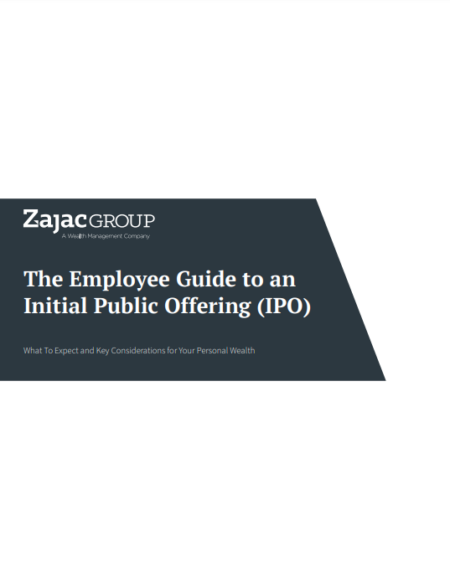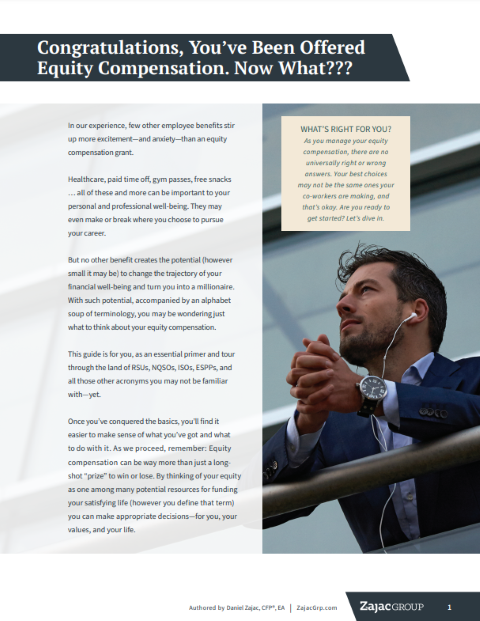When you receive equity compensation in the form of restricted stock, non-qualified stock options, or incentive stock options, you may have the opportunity to make an 83(b) election. In short, an 83(b) election is used to cause a taxable event to occur sooner than it otherwise would by making the election and making the IRS filing within the appropriate timeframe (the election must be filed with the IRS within 30 days after the grant of restricted stock or early exercise of an option). The primary reason to file an 83(b) election is that you believe that by doing so, you will pay less tax than you would have had you simply waited and allowed the awards to vest in the ordinary course.
With grants of restricted stock (83(b) elections are not available for restricted stock units), an 83(b) election allows you to be taxed on the value of your restricted stock at grant rather than at vesting.
If you have employee stock options with an early exercise provision (one that allows you to exercise your options before they vest), you can pair that early exercise with an 83(b) election. For non-qualified stock options, the 83(b) election locks in the ordinary income component of the spread at exercise and initiates the holding period for long-term capital gains purposes. For incentive stock options, the 83(b) election accelerates the taxable event for AMT purposes only, with the idea of minimizing the overall AMT impact.
If you’re considering making an 83(b) election, it’s best to consult with an advisor to understand the implications. There are many benefits to this strategy, but there also may be some downsides. This post will discuss the various factors when considering the 83(b) election.
83(b) Election and Restricted Stock
As mentioned above, it’s important to emphasize that an 83(b) election is only available for restricted stock and not restricted stock units (RSUs). There are subtle differences between the two, and the ability to make an 83(b) election is one of them.
Generally speaking, restricted stock is awarded on a specific grant date with a vesting schedule. Typically, there is no taxable event on the grant date. A taxable event occurs when the restricted stock vests and is no longer at a substantial risk of forfeiture. The value of the restricted stock upon delivery of shares is taxed as ordinary income.
Free Guide to IPOs
If you’re an executive, director, or other critical employee whose company is in the throes of an initial public offering (IPO), you’ll want to read this.
Download Now
If, during the time between grant and vest, the stock price increases meaningfully, it’s possible that you will be subject to considerably more tax, in which case an 83(b) election may have been desirable.
To illustrate the potential benefit of an 83(b) election, let’s assume the following:
- Restricted Stock Award: 100,000 shares
- Fair Market Value at Grant: $0.01
- Fair Market Value at Vest: $20
- Vesting schedule: All shares vest in 1 year
Let’s first illustrate no 83(b) election is made. At grant, no taxable event occurs. When the restricted stock vests at $20 per share, we calculate the total taxable income to be:
“FMV of Stock at Vest” x “Vested Shares” = “Taxable Income”
“Taxable Income” x “Tax Rate” = “Total Tax Due”
Or
$20 x 100,000 = $2,000,000
$2,000,000 x 37% = $740,000
Let’s now assume that an 83(b) election is filed. At grant, we figure the taxable amount to be:
“FMV of Stock at Grant” x “Vested Shares” = “Taxable Income”
$0.01 x 100,000 = $1,000
$1,000 x .37% = $370
When the restricted shares are sold, assuming long term capital gains tax rates, we see the following:
“Capital Gain” x “Long term Capital Gain Tax Rate” =
($2,000,000 – $1,000) x 20% = $399,800
If we add the two tax bills together, we figure the total tax to be $400,170.
The 83(b)-election led to a tax savings of $740,000-$400,170 or $339,830.
83(b) and Non-Qualified Stock Options
If you have non-qualified stock options with an early exercise provision, you may also be able to benefit from an 83(b) election. With NQSOs, an 83(b) may allow you to be taxed on the value of your early exercised options when the spread between the option’s exercise price and the fair market value of that stock is presumably smaller.
Continuing a similar example to above, let’s assume the following:
- Non-qualified stock options: 100,000 Options
- Exercise Price: $0.01
- Fair Market Value at Early Exercise: $0.05
- Fair Market Value at Vest and Exercise: $20
- Fair Market Value at Sale: $20
Assuming no 83(b) election and an exercise and sell at $20 per share, we can calculate the tax due to be:
[(“FMV at Vest and Exercise” – “Exercise Price”) x “Options Exercise”] x “Tax Rate” = “Tax Due”
[($20,00 – $0.01) x 100,000] x 37% = $739,630
If we compare an early exercise and filing of the 83(b) election, we have the following. At exercise:
[(“FMV at Early Exercise” – “Exercise Price”) x “Options Exercise”] x “Tax Rate” = “Tax Due”
[(0.05 – 0.01) x 100,000] x 37% = $1,480
And upon final sale, the tax due will be:
Long Term Capital Gain x “LTCG Tax Rate” = “Tax Due”
($2,000,000 – $5,000) x 20% = 399,000
For a total tax due of $400,480.
83(b) and Incentive Stock Options
If you have incentive stock options, an 83(b) election may be a good idea, but it also may be less desirable when compared to non-qualified stock options. With incentive stock options, an 83(b) election is only effective for accelerating the impact of AMT, not for regular tax.
The 83(b) election will not be effective for purposes of starting the one year holding period for determining a qualifying disposition upon the sale of incentive stock options and thus preferential tax treatment. Instead, for a qualifying disposition, the sale of stock must occur at least one year beyond the vesting date of the ISO, regardless of an early exercise and filing of an 83(b) election.
This does not mean that an 83(b) for ISOs is not a good idea. In fact, an 83(b) for ISO may still be advantageous if you seek to mitigate AMT. An early exercise (pre-vesting) and hold while the spread between the exercise price of the option and the FMV is still relatively narrow could make sense so long as you plan to hold the stock one year beyond the vesting date. In such a case, any potential AMT liability should be minimized compared to waiting until the options vested to exercise.
Advantages of an 83(b) Election
The 83(b) election can be attractive if the current FMV of the stock is at or near zero for restricted shares or if the FMV of the underlying stock is at or near the exercise price of an option. If so, and the stock appreciates after the 83(b) election is filed, all of the appreciation would be taxed at long-term capital gains rates when the shares are ultimately sold (assuming the holding period requirements are met). This can be particularly attractive if the cost to exercise and the tax cost incurred due to the 83(b) is negligible. The smaller the combined cost of these two, the more sense it may make to utilize this strategy.
Disadvantages of 83(b) Elections
However, before making an 83(b) election, there are downsides to consider. First, if the stock falls in value after you file your 83(b), you may be paying more for a stock than you may be able to sell it for. In a bad outcome, you may pay for a stock and not be able to sell it at all. And, if you do eventually sell the stock for a loss, you will not be allowed a deduction for any amounts reported as income as a result of making the election.
The second risk is potentially paying more tax on an 83(b) at the time you elect than you would have had you simply waited until the options/shares vest if the stock price has declined.
Recapping an 83(b) Election
Let’s explore a few other scenarios to consider while weighing the 83(b) election:
First, if you do early exercise and leave the company before shares vest, your company may have a repurchase right on those shares. 83(b) doesn’t protect you from this right, so it’s essential to understand the company’s policies. Since many equity compensation awards require a certain amount of time to vest, you should be well familiar with the vesting schedule if you’re thinking about making an 83(b) election.
Second, if the company goes public or is acquired, the 83(b) election might end up being a far better outcome in terms of taxes paid as compared to no 83(b) election at all.
Third, if you make an 83(b) election, you are essentially prepaying taxes on a future event. Depending on your company’s financial standing, your company may never end up going public or having a liquidity event. This could result in a loss of capital and/or a loss of taxes paid at early exercise.
Finally, if you want to pursue an 83(b) election, it’s essential to understand how they work, so you file the correct paperwork in a timely manner. It is critical that you file the 83(b)-election form with the IRS within 30 days of receiving your restricted stock award or within 30 days of exercising your options.
Should You Make an 83(b) Election?
The 83(b) election makes the most sense for people who have a small cost to buy/exercise shares of stock and will incur a minimal tax impact. Couple these facts with the hope that the company’s stock will go up in value, and an 83(b) can be incredibly valuable.
However, it’s important to understand the 83(b) election before making any decisions about your equity compensation, as it is not without risk. The risk of an 83(b) election is that you may end up paying taxes on the stock at its current value, even if it declines in the future, and this could lead to a loss of money on your investment.
So, should you make an 83(b) election? That depends on your circumstances. It’s important to weigh the pros and cons carefully and talk with a financial advisor about the possible impacts of an 83(b) election on your taxes and investment. And remember, once you make an 83(b) election, it’s irrevocable.










0 Comments